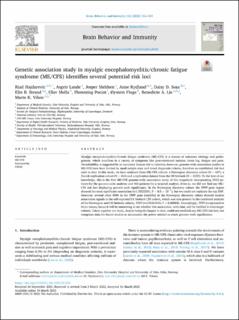| dc.contributor.author | Hajdarevic, Riad | |
| dc.contributor.author | Lande, Asgeir | |
| dc.contributor.author | Mehlsen, Jesper | |
| dc.contributor.author | Rydland, Anne | |
| dc.contributor.author | Sosa, Daisy D. | |
| dc.contributor.author | Strand, Elin Bolle | |
| dc.contributor.author | Mella, Olav | |
| dc.contributor.author | Pociot, Flemming | |
| dc.contributor.author | Fluge, Øystein | |
| dc.contributor.author | Lie, Benedicte Alexandra | |
| dc.contributor.author | Viken, Marte Kathrine | |
| dc.date.accessioned | 2022-05-27T12:04:18Z | |
| dc.date.available | 2022-05-27T12:04:18Z | |
| dc.date.created | 2022-04-10T13:29:55Z | |
| dc.date.issued | 2022 | |
| dc.identifier.citation | Brain, Behavior, and Immunity. 2022, 102, 362-369. | en_US |
| dc.identifier.issn | 0889-1591 | |
| dc.identifier.uri | https://hdl.handle.net/11250/2996467 | |
| dc.description | This is an open access article under the CC BY license (http://creativecommons.org/licenses/by/4.0/). | en_US |
| dc.description.abstract | Myalgic encephalomyelitis/chronic fatigue syndrome (ME/CFS) is a disease of unknown etiology and pathogenesis, which manifests in a variety of symptoms like post-exertional malaise, brain fog, fatigue and pain. Hereditability is suggested by an increased disease risk in relatives, however, genome-wide association studies in ME/CFS have been limited by small sample sizes and broad diagnostic criteria, therefore no established risk loci exist to date. In this study, we have analyzed three ME/CFS cohorts: a Norwegian discovery cohort (N = 427), a Danish replication cohort (N = 460) and a replication dataset from the UK biobank (N = 2105). To the best of our knowledge, this is the first ME/CFS genome-wide association study of this magnitude incorporating 2532 patients for the genome-wide analyses and 460 patients for a targeted analysis. Even so, we did not find any ME/ CFS risk loci displaying genome-wide significance. In the Norwegian discovery cohort, the TPPP gene region showed the most significant association (rs115523291, P = 8.5 × 10− 7 ), but we could not replicate the top SNP. However, several other SNPs in the TPPP gene identified in the Norwegian discovery cohort showed modest association signals in the self-reported UK biobank CFS cohort, which was also present in the combined analysis of the Norwegian and UK biobank cohorts, TPPP (rs139264145; P = 0.00004). Interestingly, TPPP is expressed in brain tissues, hence it will be interesting to see whether this association, with time, will be verified in even larger cohorts. Taken together our study, despite being the largest to date, could not establish any ME/CFS risk loci, but comprises data for future studies to accumulate the power needed to reach genome-wide significance. | en_US |
| dc.language.iso | eng | en_US |
| dc.publisher | Elsevier | en_US |
| dc.rights | Navngivelse 4.0 Internasjonal | * |
| dc.rights.uri | http://creativecommons.org/licenses/by/4.0/deed.no | * |
| dc.subject | GWAS | en_US |
| dc.subject | immunochip | en_US |
| dc.subject | ME/CFS | en_US |
| dc.title | Genetic association study in myalgic encephalomyelitis/chronic fatigue syndrome (ME/CFS) identifies several potential risk loci | en_US |
| dc.type | Peer reviewed | en_US |
| dc.type | Journal article | en_US |
| dc.description.version | publishedVersion | en_US |
| dc.rights.holder | © 2022 The Author(s). Published by Elsevier Inc. | en_US |
| dc.source.pagenumber | 362-369 | en_US |
| dc.source.volume | 102 | en_US |
| dc.source.journal | Brain, Behavior, and Immunity | en_US |
| dc.identifier.doi | 10.1016/j.bbi.2022.03.010 | |
| dc.identifier.cristin | 2016462 | |
| cristin.ispublished | true | |
| cristin.fulltext | original | |
| cristin.qualitycode | 2 | |

